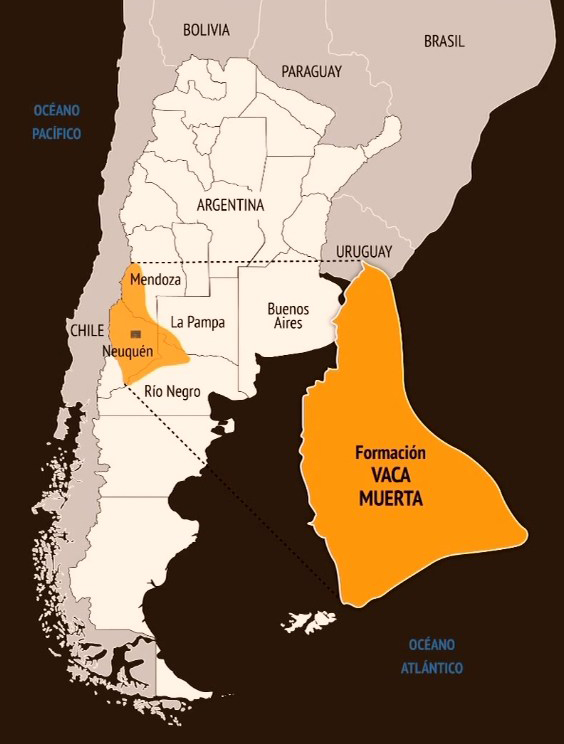RIO DE JANEIRO, BRAZIL – The commitments Argentina has made in the face of the climate crisis have left the country wondering how to develop the giant Vaca Muerta unconventional hydrocarbon field, in which it had placed enormous expectations to reignite economic growth, end gas supply problems and generate foreign currency.
“Argentina has been sidelined because Vaca Muerta has an expansion plan that is not compatible with the Paris Agreement,” said Fernando Navajas, chief economist of the Latin American Foundation for Economic Research and an expert on the energy issue, who pointed out that “the use of gas in the energy matrix cannot be replaced quickly.”
The impact of the Covid 19 pandemic has driven the global climate agenda: Argentina committed to a more ambitious goal of limiting greenhouse gas emissions by 2030 at the U.S.-organized climate summit last April.
Meanwhile, the transition to net-zero emissions by 2050 projected in last May’s International Energy Agency report is even more ambitious.
The acceleration of the energy transition reduced the maturity horizon of the Vaca Muerta investment by 10 years. “You had Vaca Muerta for 30 years and now you have it for 20,” Navajas noted.
To comply with the Paris Agreement, he added, Argentina could “downsize” or “realign” the project, which occupies 30,000 square kilometers in the southwest of the country with its epicenter in Neuquén province, is the second-largest unconventional gas reserve in the world and the fourth largest oil reserve of its kind.
Read also: Check out our extensive coverage on Argentina
At the same time, Argentina would have to reduce the weight of 85% hydrocarbons in the primary energy production matrix and increase “clean” electricity generation from thermal generation by 65.1% in the first four-month period, according to the Mosconi Institute.
Argentina is making progress in electricity generation with renewable energy sources, which are supported with fiscal assistance: In the first four-month period, it reached 11.5% of the total, according to Mosconi, compared to 9.5% in 2020 and toward the goal of 20% by 2025. But this improvement explains only one-fifth of the 15% of the primary matrix that does not come from hydrocarbons.
VALIDATING VACA MUERTA7
“The turnaround will be faster than we think, and it is costly because from an economic point of view it means replacing primary energy with capital,” Navajas said of the movement to install wind turbines for wind power generation and panels for solar energy.
Consequently, he warned that the country must “start in several places at once” by making gas production cheaper, electrifying transportation, reducing pollution in agriculture and industry and forestry, reducing subsidies for energy consumption and regulating electricity prices.
This plan includes “validating the Vaca Muerta because the country needs economic growth, resources and dollars; not everyone has these world-class assets,” he explained.
Therefore, he said that Argentina “must take compensatory measures” – reforestation, urban decentralization, green infrastructure – and eventually divert Vaca Muerta production to export only oil or use the gas to produce blue hydrogen, for example.
And that “multilateral organizations must help” because “it is necessary to invest with the support of foreign direct investment and multilateral organizations for an aggressive reforestation plan.”
This reforestation, he explained, “puts the country on a path to sequester carbon, so Argentina’s bill becomes favorable. And it is a window to slowly remove gas from the energy matrix.”
OIL COMPANY
The most difficult challenge to achieving this energy transition is the “political economy that goes toward hydrocarbon resources,” Navajas said.
This is “a powerful alliance between oil companies, provinces, municipalities and unions” that calls for the price of gas to be set as high as possible so that producers can raise royalties collected by the provinces and workers’ wages.
Meanwhile, Argentina has the majority state-owned oil company YPF, which has interests in Vaca Muerta.
“This coalition is going in the opposite direction to environmental protection and in the opposite direction on fiscal matters,” Navajas warned.
The economist said that “federalism is the enemy of the energy transition” because provinces linked to biofuels and renewable energy are asking for fiscal transfers to develop these sectors.
“Investments are needed that really come and are not generated by fiscal subsidies,” Navajas said, acknowledging that the cost of capital in Argentina is high because there is a high country risk.


